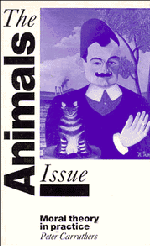Book contents
- Frontmatter
- Contents
- Preface
- 1 Moral argument and moral theory
- 2 Utilitarianism and contractualism
- 3 Utilitarianism and animal suffering
- 4 Utilitarianism and the harm of killing
- 5 Contractualism and animals
- 6 Animals and rational agency
- 7 Contractualism and character
- 8 Animals and conscious experience
- Conclusion
- Notes
- Index
6 - Animals and rational agency
Published online by Cambridge University Press: 03 May 2011
- Frontmatter
- Contents
- Preface
- 1 Moral argument and moral theory
- 2 Utilitarianism and contractualism
- 3 Utilitarianism and animal suffering
- 4 Utilitarianism and the harm of killing
- 5 Contractualism and animals
- 6 Animals and rational agency
- 7 Contractualism and character
- 8 Animals and conscious experience
- Conclusion
- Notes
- Index
Summary
In this chapter I shall consider how much truth there is in the simplifying assumption made throughout Chapter 5 – namely, that no animals are rational agents in the sense that would be necessary to ensure that they have moral standing within contractualism.
CLEVER HANS AND THE SPHEX WASP
Plainly there is no problem of principle about animals being rational agents – whatever, precisely, the relevant sense of ‘rational agent’ might turn out to be (this will be investigated as we go along). For example, if the story I told in Chapter 3 of the university educated apes had turned out to be true – or, indeed, if almost any story from children's literature, such as Richard Adams's Watership Down, were to turn out to be true – then it is clear that the animals involved would be rational agents. Our question is one of fact, not of principle. We are to consider whether there is sufficiently good reason for thinking that any animals are rational agents. I shall begin with two (true) tales designed to illustrate the pitfalls involved in interpreting animal behaviour.
Clever Hans was a horse who lived in the late nineteenth century, who was widely believed to be able to count. If an array of objects was placed before him, and he was asked how many there were, Hans would stamp his hoof the appropriate number of times.
- Type
- Chapter
- Information
- The Animals IssueMoral Theory in Practice, pp. 122 - 145Publisher: Cambridge University PressPrint publication year: 1992



